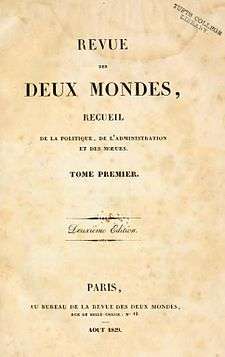Revue des deux Mondes
The Revue des deux Mondes (French: [ʁəvy de dø mɔ̃d], Review of the Two Worlds) is a French-language monthly literary, cultural and current affairs magazine that has been published in Paris since 1829.[1]
 | |
| Discipline | Literature, history, art and science |
|---|---|
| Language | French |
| Edited by | Société de la Revue des Deux Mondes |
| Publication details | |
| History | 1829-present |
| Frequency | Monthly |
| Standard abbreviations | |
| ISO 4 | Rev. Deux Mondes |
| Indexing | |
| ISSN | 0035-1962 |
| OCLC no. | 476419311 |
| Links | |
According to its website, "it is today the place for debates and dialogues between nations, disciplines and cultures, about the major subjects of our societies". The main shareholder is Marc Ladreit de Lacharrière's FIMALAC Group.
History
The Revue des deux Mondes was founded by Prosper Mauroy and Pierre de Ségur-Dupeyron, first appearing on 1 August 1829. The anodyne periodical with the subtitle Journal des voyages was purchased by a young printer, Auguste-Jean Auffray, who convinced his college roommate François Buloz to edit it: its original emphasis on travel and foreign affairs soon shifted;[2] according to its website, it was created in order to "establish a cultural, economic and political bridge between France and the United States", the Old World and the New.[lower-alpha 1] It was purchased in 1831 by Charles Buloz, who was its editor until 1877. Another influential editor in its history was Ferdinand Brunetière (after 1893).
Among the early regular contributors who established the review's reputation as an elite liberal vehicle of haute culture were Albert, 4th duc de Broglie, François Guizot, Jacques Nicolas Augustin Thierry, Ludovic Vitet, Paul-François Dubois, the literary critics Charles Augustin Sainte-Beuve and Gustave Planche, and Jean-Jacques Ampère.[2][3]
Heinrich Heine first published an essay in three parts in 1834, De l'Allemagne depuis Luther, a history of emancipation in Germany beginning with the Reformation.[4]
Chief editors
- François Buloz, 1831–1877;
- Charles Buloz, 1877–1893;
- Ferdinand Brunetière, 1893–1906;
- Francis Charmes, 1907–1915;
- René Doumic, 1916–1937;
- André Chaumeix, 1937–1955;
- Claude-Joseph Gignoux, 1955–1966;
- Jean Vigneau, 1966–1970;
- Jean Jaudel, 1970–1991;
- Jean Bothorel, 1991–1995;
- Bruno de Cessole, 1995–1999;
- Nathalie de Baudry d’Asson, 1999–2002;
- Michel Crépu, 2002–2014;
- Valerie Toranian, 2014–present.
Notes
- This bridge may explain Wallace Stevens's reference to the Revue in his poem Colloquy with a Polish Aunt.
References
- de Broglie, Gabriel (1979). Histoire politique de la "Revue des deux mondes." (in French). Paris: Perrin. ISBN 2-262-00147-2.
- Guthrie, Christopher E. (January–March 1984). "The "Revue des Deux Mondes" and Imperial Russia, 1855-1917". Cahiers du Monde russe et soviétique. 25 (1): 93–111.
- Furman, Nelly (1975). La "Revue des deux mondes" et le Romantisme: (1831-1848) (in French). Geneva: Librairie Droz. ISBN 978-2-600-03541-5.
- Goetschel, Willi (28 January 2007). "Zur Geschichte der Religion und Philosophie in Deutschland [On the History of Religion and Philosophy in Germany]" (PDF). The Literary Encyclopedia. University of Toronto.
External links
- La Revue des deux mondes online in Gallica, the digital library of the French National Library
- Revue des deux Mondes at the HathiTrust Digital Library
